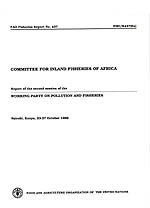 | FAO Fisheries Report No.437 FIRI/R437 (En)
COMMITTEE FOR INLAND FISHERIES OF AFRICA
Report
of the
SECOND SESSION OF THE WORKING PARTY ON POLLUTION AND FISHERIES
Nairobi, Kenya, 23–27 October 1989
FOOD AND AGRICULTURE ORGANIZATION OF THE UNITED NATIONS
Rome 1990
|
| The designations employed and the presentation of the material in
this publication do not imply the expression of any opinion
whatsoever on the part of the Food and Agriculture Organization of
the United Nations concerning the legal status of any country,
territory, city or area or of its authorities, or concerning the
delimitation of its frontiers or boundaries. |
The designations employed and the presentation of material in this
publication do not imply the expression of any opinion whatsoever on
the part of the Food and Agriculture Organization of the United
Nations concerning the legal status of any country, territory, city or
area or of its authorities, or concerning the delimitation of its frontiers
or boundaries.
M-45
ISBN 92-5-102975-X
All rights reserved. No part of this publication may be reproduced, stored in a
retrieval system, or transmitted in any form or by any means, electronic, mechanical,
photocopying or otherwise, without the prior permission of the copyright owner.
Applications for such permission, with a statement of the purpose and extent of the
reproduction, should be addressed to the Director, Publications Division, Food and
Agriculture Organization of the United Nations, Via delle Terme di Caracalla, 00100
Rome, Italy.
PREPARATION OF THIS REPORT
This is the final version of the report as approved by the second session of the Working Party on
Pollution and Fisheries of the Committee for Inland Fisheries of Africa (CIFA).
| DEFINITION OF MARINE POLLUTION |
| Pollution of the marine environment means: “The introduction by man, directly or indirectly, of substances or energy into the marine environment (including estuaries) resulting in such deleterious effects as harm to living resources, hazards to human health, hindrance to marine activities including fishing, impairment of quality for use of sea water and reduction of amenities”. |
| IMO/FAO/Unesco/WMO/WHO/IAEA/UN/UNEP Joint Group of Experts on the Scientific Aspects of Marine Pollution (GESAMP) |
Distribution
Members of CIFA
Mailing List CIFA
FAO Fisheries Department
FAO Regional Fisheries Officers
© FAO 1990
Committee for Inland Fisheries of Africa.
Report of the second session of the Working Party on Pollution and Fisheries. Nairobi, Kenya, 23–27 October 1989.
FAO Fisheries Report. No. 437. Rome, FAO. 1990. 24 p. |
| ABSTRACT |
| This document is the final report of the second session of the CIFA Working Party on Pollution and Fisheries, held in Nairobi, Kenya, from 23 to 27 October 1989. The Working Party reviewed the intersessional activities since its first session in 1986. It finalized a study on the scientific bases for the control of domestic and industrial organic pollution loads; the study is annexed to this report. The Working Party plans to prepare a paper on metal pollution in African inland waters during the forthcoming intersessional period. Since by then a broad database on water pollution problems would be available, it was recommended to hold a symposium on pollution and fisheries in connexion with the Ninth Session of CIFA. It was further proposed that CIFA establish a close link with UNEP's programme on ‘Protection of the Quality of Freshwater Resources’ to ensure that water quality and quantity issues relevant to fisheries development and aquaculture are duly taken into account. |
1. OPENING OF THE SESSION
2. REPORT ON INTERSESSIONAL ACTIVITIES
3. SCIENTIFIC BASES FOR CONTROL OF ORGANIC POLLUTION IN
AFRICAN INLAND WATERS
4. FUTURE WORK PROGRAMME AND RECOMMENDATIONS
5. APPROVAL OF THE REPORT AND CLOSING OF THE SESSION
Annex I: Agenda
Annex II: List of Participants
Annex III: Documentation
Annex IV: Scientific Bases for Pollution Control in African
Inland Waters - Domestic and Industrial Organic Loads
